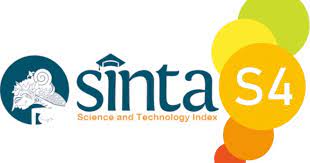Improving high school students’ speaking skill through role play strategy: A classroom action research
DOI:
https://doi.org/10.22219/englie.v5i1.30366Keywords:
Classroom Action Research, Role Play, Speaking SkillsAbstract
This study utilized Classroom Action Research and was carried out during a teaching internship in a Junior High School in Batam, Indonesia involving 20 eighth-grade students. The objective of the study is to investigate the impact of implementing the Role Play Strategy on students' attitude, interest, and effort in practicing English speaking skills. The research was structured into distinct stages, including planning, action, observation, and reflection. The research instruments used were observation, pre-test, and post-test. The students were initially observed during their English lessons, after which the pre-test and post-test were administered to evaluate the improvement in their speaking skills. A rubric was devised to assess the students' speaking skills across various aspects. The post-test results revealed a significant improvement in the students' scores compared to the pre-test, demonstrating the effectiveness of the Role Play Strategy in enhancing their speaking abilities. The students' average score for the pre-test was 67.85 points, while their average score for the post-test was 73 points after the implementation of Role Play. Therefore, it can be concluded that the use of Role Play Strategy in classroom instruction is an effective approach for promoting students' speaking skills. The result suggests that the teachers should use creative and modified teaching materials to improve students' curiosity in learning English.
Downloads
References
Altrichter, H., Kemmis, S., Mctaggart, R., & Zuber-Skerritt, O. (2002). The concept of action research. The Learning Organization, 9(3), 125–135. https://doi.org/https://doi.org/10.1108/09696470210428840
Banach, M., Rataj, A., Ralph, M., & Allosso, L. (2018). Learning social work through role play: Developing more confident and capable social workers. Journal of Practice Teaching and Learning, 17(1), 42-60. https://doi.org/10.1921/jpts.v17i2.1308
Barua, P. D., Zhou, X., Gururajan, R., & Chan, K. C. (2019). Determination of factors influencing student engagement using a learning management system in a tertiary setting. Proceedings: International Conference on Web Intelligence. https://doi.org/https://doi.org/10.1109/WI.2018.00-30
Berry, L. A., & Kowal, K. B. (2022). Effect of role-play in online discussions on student engagement and critical thinking. Online Learning, 26(3), 4-21. https://doi.org/10.24059/olj.v26i3.3367
Bogdan, B., & Bilken, S. K. (1992). Quality research for education: An introduction to theory and methods. Allyn and Bacon. https://www.researchgate.net/publication/351904246
Brogt, E., Wilson, T., Kennedy, B., & Dohaney, J. (2017). Using role-play to improve students’ confidence and perceptions of communication in a simulated volcanic crisis. http://hdl.handle.net/10092/15432
Cabaltica, Rochelle, & Arcala, R. J. M. (2021). Factors affecting the speaking skills of second English language learners. Galaxy International Interdisciplinary Research Journal (GIIRJ), 9(5), 121-134.
Dewi, K. T. K. (2021). Thinking critically through storytelling technique: enhancing students' HOTS and English speaking skill. Journal of Educational Study, 1(1), 67–75. https://doi.org/10.36663/joes.v1i1.151
Dewi, S., Yuliana, Y. G. S., & Oktavianda, M. (2020). Using modified guided writing and role-play to motivate students to practice speaking. Journal of English Language Teaching Innovations and Materials (Jeltim), 2(1), 36–48. https://doi.org/10.26418/jeltim.v2i1.37833
Geneuss, K., Obster, F., & Ruppert, G. (2020). “I have gained self-confidence”. Exploring the impact of the role-playing technique STARS on students in German lessons. Scenario: A Journal of Performative Teaching, Learning, Research, 46–67. https://doi.org/10.33178/scenario.14.1.4
Gusmuliana, P., Apriani, E., & Syafryadin. (2021). Improving students speaking motivation by using role play technique at Institute Islamic in Indonesia. 356–361. https://doi.org/10.2991/assehr.k.210227.060
Gutiérrez-Huancayo, V. R. (2022). Enhancing oral skills and motivation through role-playing activities in medical students. European Journal of Educational Research, 11(4), 2139–2151.
Hamid, N. S. A. (2021). Role play to improve students’ participation in learning English: A report from a high school in East Java. English Didactic, 2(2), 52-57. https://doi.org/10.55171/ed.v2i2.834
Kostania, G., Kuswati, K., & Ratnawati, F. (2015). The aplication of role play method to increase participation of students in learning management of midwifery at diploma III of midwifery students. Cakrawala Pendidikan, 2, 87462. https://doi.org/10.21831/cp.v2i2.4834
Krisdiana, B.P, Irawati, E., & Kadarisman, A. E. (2018). The Effectiveness of Role-Play Integrated with Word Cards on Students: Speaking Skill for Communication. Jurnal Pendidikan Humaniora, 6(2), 78–84. http://journal.um.ac.id/index.php/jphpISSN:2338-8110/eISSN:2442-3890
Larsen-Freeman, D., & Freeman, D. (2008). Language moves: The place of “foreign” languages in classroom teaching and learning. Review of Research in Education, 32(1). https://doi.org/https://doi.org/10.3102/0091732X07309426
Listyani, L & Kristie, L. S. (2018). Teachers’ strategies to improve students’ self-confidence in speaking: A study at two vocational schools in Central Borneo. Register Journal, 11(2), 139. https://doi.org/10.18326/rgt.v11i2.139-153
Li, J., & Xue, E. (2023). Dynamic interaction between student learning behaviour and learning environment: Meta-analysis of student engagement and its influencing factors. Behavioral Sciences, 13(1). https://doi.org/https://doi.org/10.3390/bs13010059
Norris, J. M., Davis, J. M., & Timpe-Laughlin, V. (2017). Second language educational experiences for adult learners, second language educational experiences for adult learners. In Routledge. Routledge. https://doi.org/https://doi.org/10.4324/9781315230801
Nuraini, N. (2022). The influence of role play technique and learning motivation towards the tenth grade students' speaking ability. Esteem Journal of English Education Study Programme, 5(1), 32-40. https://doi.org/10.31851/esteem.v5i1.7289
Nuranda, I. (2018). The use of role play technique to improve students' speaking ability at grade x of senior high school. Journal of English Language and Language Teaching (JELLT), 2(1), 89-94.
Ordem, E. (2017). Developing critical-thinking dispositions in a listening/speaking class. English Language Teaching, 10(1), 50–55. http://dx.doi.org/10.5539/elt.v10n1p50
Ramezani, R., Larsari, E. E., & Kiasi, M. A. (2016). The relationship between critical thinking and EFL learners’ speaking ability. English Language Teaching, 9(6), 189–198. http://dx.doi.org/10.5539/elt.v9n6p189
Razi, F., Muslem, A., & Fitrisia, D. (2021). Teachers’ strategies in teaching speaking skill to junior high school students. English Education Journal, 12(3), Article 3. https://doi.org/10.24815/eej.v12i3.19136
Rina, P., Sudarsono, & Sutapa, G. (2019). Using role play technique to improve students speaking. Jurnal Pendidikan dan Pembelajaran Khatulistiwa, 8(6), 1–10. https://jurnal.untan.ac.id/index.php/jpdpb/article/view/33250
Rojas, M. A., & Villafuerte, J. (2018). The Influence of Implementing Role-Play as an Educational Technique on EFL Speaking Development. Theory and Practice in Language Studies, 8(7). https://doi.org/https://doi.org/10.17507/tpls.0807.02
Sanavi, R. V., & Tarighat, S. (2014). Critical thinking and speaking proficiency: A mixed-method study. Theory and Practice in Language Studies, 4(1), 79–87. https://doi.org/10.4304/tpls.4.1.79-87
Shangeetha, R. K. (2011). Benefits and shortcomings of role play as speaking activity in English language classrooms. The English Teacher, XXXIX, 72–93.
Stevens, R. (2015). Role-Play and student engagement: Reflections from the classroom. Teaching In Higher Education, 20(5), 481–492. https://doi.org/10.1080/13562517.2015.1020778
Suh, J.-S., Wasanasomithi, P., Short, S., & Majid, N. A. (1999). Out of class learning experiences and students' perceptions of their impact on English conversation skills.
Toding, R. W., Yahrif, M., & Sirajuddin, S. (2021). Using unscripted role-play teaching activity to improve students: Speaking ability. Professional Journal of English Education, 4(6). https://doi.org/10.22460/project.v4i6.p1057-1066
Tompkins, P. (1998). Role Playing/Simulation. The Internet TESL Journal. http://iteslj.org/Techniques/Tompkins-RolePlaying.html
Wahyuningsih, S., & Afandi, M. (2020). Investigating english speaking problems: implications for speaking curriculum development in Indonesia. European Journal of Educational Research, 9(3), 967-977. https://doi.org/https://doi.org/10.12973/EU-JER.9.3.967
Wulandari, H. (2020). Strategies in teaching speaking used by teachers of young, junior high school, senior high school, and university students. E-Structural (English Studies on Translation, Culture, Literature, and Linguistics), 3(02), Article 02. https://doi.org/10.33633/es.v3i02.4225
Downloads
Published
How to Cite
Issue
Section
License
Copyright (c) 2024 Sayow et al

This work is licensed under a Creative Commons Attribution-ShareAlike 4.0 International License.
Authors who publish with English Learning Innovation (englie) agree to the following terms:
- For all articles published in English Learning Innovation (englie), copyright is retained by the authors. Authors give permission to the publisher to announce the work with conditions. When the manuscript is accepted for publication, the authors agree to automatic transfer of the publishing right to the publisher.
- Authors retain copyright and grant the journal right of first publication with the work simultaneously licensed under a Creative Commons Attribution-ShareAlike 4.0 International License that allows others to share the work with an acknowledgement of the work's authorship and initial publication in this journal.
- Authors are able to enter into separate, additional contractual arrangements for the non-exclusive distribution of the journal's published version of the work (e.g., post it to an institutional repository or publish it in a book), with an acknowledgment of its initial publication in this journal.
- Authors are permitted and encouraged to post their work online (e.g., in institutional repositories or on their website) prior to and during the submission process, as it can lead to productive exchanges, as well as earlier and greater citation of published work (See The Effect of Open Access).
This work is licensed under a Creative Commons Attribution-ShareAlike 4.0 International License.
















1.png)












